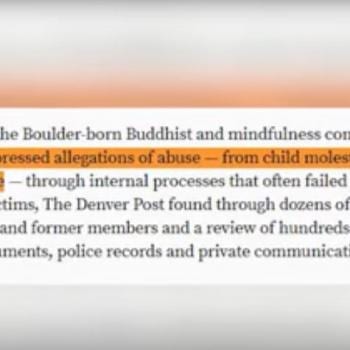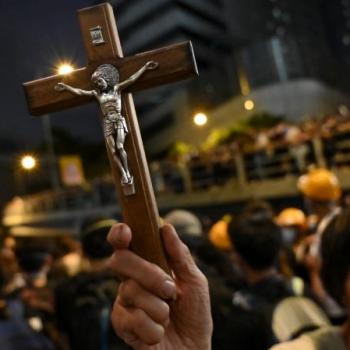For Monday, July 9, 2012.
I’m catching up on a few missed weeks here, just pulling myself out of the ‘Busy’ trap step by step. I’m also beginning training and fundraising for Buddhist Global Relief for an upcoming half marathon here in Bristol (Huge thanks to Charles Prebish, Marnie L. Froberg, and Lynette Monteiro for the generous support).
On to the news. Matthew Remski has another piece out on the Michael Roach/Diamond Mountain cult death, titled The Michael Roach Bubble, where he further examines the psychology and sociology of the cult and specific inner-circle members. My own hobby-horse in this is the need for some sort of oversight of Buddhist organizations in the West. When I wrote about the story hiting the New York Times, I reiterated this. A recent comment there states:
I couldn’t agree more with this. Oversight is badly needed at American Buddhist organizations. Teachers – especially in the Zen and Tibetan traditions – have great power over students, and while they rarely abuse it, sometimes they do. We shouldn’t need a man’s death to remind us of this. There’s no reason at all why Buddhist leaders shouldn’t teach at the behest and at the pleasure of independent boards to which they are accountable. I know that the SF Zen Center is already partly run on these principles. But many other organizations resist, apparently believing that ‘it won’t happen here’. Well, it may.
From Matthew Remski’s latest, here is some of the key background:
– Christy McNally’s letter, April 19th
– Michael Roach’s open letter, April 26th
– my original post, May 4th
– John Stillwell’s rebuttal, May 6th
– my followup, May 19th
– Michael Roach’s essay, June 2nd
– NYT article, June 5th
When I traveled to Burma last year, I read about the dispute over the name: is it Burma or Myanmar? With the release of Aung San Suu Kyi and her recent world tour, openly refering to her country as Burma, the dispute has only gained more publicity. In simple terms, the country has been known as Burma since it was a British colony (1886-1948). At independence it retained that name, but in 1989, the ruling military junta renamed the country Myanmar. They claimed to be tossing off the old colonial titles, akin to Calcutta returning to Kolkata or Bombay to Mumbai. However, the name change also acted to reinforce the junta’s claim to legitamacy, which was questioned both internally and externally. Foreign governments wanting friendly relations with the junta happily accepted the name change, while those opposing it retained the name Burma. Activists supporting Aung San Suu Kyi, and ‘the lady’ herself, continue to call the country Burma.
In the news, an excellent analysis can be found at the “Foreign Policy” webite here. Interestingly, a recent Wall Street Journal article on the topic calls the country Myanmar and puts Burma in scare-quotes. Zee news (of India) uses both names without scare quotes but does refer to Aung San Suu Kyi as a “Myanmar opposition leader.” In his analysis posted at the WIP (Women’s International Perspective) Cesar Chelala writes:
Some people, such as Derek Tonkin, Britain’s former ambassador to Thailand and chairman of the Network Myanmar group, suggest that both Britain and the US should now call the country Myanmar, to acknowledge the country’s progress to democracy.
However, as the daughter of Aung San, considered the father of modern-day Burma and a tireless fighter for democracy and human rights in her country, nobody has greater moral authority than Aung San Suu Kyi to call the country by its former name.
Suu Kyi was in England last month, in part to recieve an honourary degree from Oxford. You can read about that and see part of her speech at the BBC, or see the full speech at the University of Oxford’s podcast site. And back in Burma, Augn San Suu Kyi has made her parliament debute today.
A likely more pressing issue in Burma recently has been the outbreak of violence there between Buddhists and Muslims of different ethnic groups. The Muslims, members of the ethnic minority Rohingya, have been targeted over the past couple weeks. Videos can be seen here from Reuters and AlJazeera (which also refers to Burma as Myanmar). This case only highlights the instabilities in the region, including in neighboring Bangaladesh, a majority Muslim country where the minority Buddhists in the Chittagong region have suffered for decades. Anyone in DC tomorrow can attend a National Press Club conference on the plight of the Rohingya.
Meanwhile, in Japan, Buddhists are becoming increasingly vocal in the anti-nuclear power activism there. This spring I had the opportunity to speak with Brian Victoria, an ordained Zen priest, activist, and academic and current head of Antioch Buddhist Studies in Japan. In our conversation he warned of the possibility of increasing destabilization of Japan that is likely to follow from the Fukushima disaster, which is still not fully contained.
And in Taiwan, the “first gay Buddhist wedding” is planned for next month. Fish Huang, who will marry her partner of seven years, states that “We are not only doing it for ourselves, but also for other gays and lesbians.”
Despite the profound Buddhist-ish-ness of the marriage ceremony, Fish Huang tells the Taipei Times that many of her Buddhist friends were initially wary of attending the event, worrying that doing so might conflict with their vows. She wrote to a Buddhist master, asking for the party line on homosexuality, and the master not only told her that Buddhism, as she knew it, was a-okay with lesbian weddings — the master offered to perform Fish Huang’s lesbian wedding.











